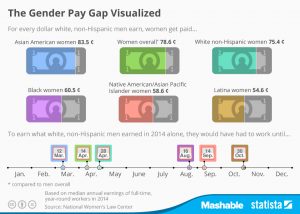Closing the Gender Wage Gap
On Tuesday, April 10thAmericans recognized Equal Pay Day, which is intended to raise awareness about the gender wage gap and symbolizes how far into the year women must work to earn the same that men earned the previous year. Equal Pay in America has a long history, beginning with the Equal Pay Act of 1963. The Equal Pay Act of 1963 was the first legislation that requires men and women to be paid equal amounts for equal work in the same establishment. “Equal work” does not mean that they must have the same job title, but rather the same job content in order to be deemed equal. Unless pay differentials are proven to reasonable and earned then the company must correct the pay differential by raising the wage of the lower paid employee. Lawmakers continued to work towards closing the gender wage gap when they passed Title VII of the Civil Rights Act of 1964, stating that employers are prohibited from discriminating against employees based off of their sex, race, or religion. Despite these efforts to work towards equal pay, unfortunately we still see a huge wage gap between men and women today.
As of 2018, women in the United States are still only being paid eighty cents to every dollar that men earn, and although so much progress has been made since the passing of the Equal Pay Act in 1963, the battle is still far from over. Currently, the fight is focused on passing the Paycheck Fairness Act, which seeks to tackle and eliminate any loopholes in the Equal Pay Act. The Paycheck Fairness Act would ensure protection against retaliation for discussing salaries with colleagues, require employers to prove that pay differences exist for legitimate reasons, give the same remedies for sex-based wage discrimination claims as the ones that are available for race- or ethnicity-based wage claims, and create negotiation skills training programs for women. The Paycheck Fairness Act would make extraordinary differences in the gender wage gap; however, the bill has been unable to pass time and time again.
As women’s success in the workforce continues to grow, topics like equal pay are coming to the forefront of our political conversation. Women and men alike are demanding attention be paid to discrepancies that hinder a woman’s path to success, such as the wage pay gap. An inability to pass the Paycheck Farness Act is threatening the political equality that is so fundamental to the success of our democracy. If everyone does not have fair and equal access to necessities like wages that are crucial to a woman’s life then political equality is threatened, ultimately undermining popular sovereignty and the success of this democracy
https://nwlc.org/resources/how-the-paycheck-fairness-act-will-strengthen-the-equal-pay-act/
https://www.aauw.org/what-we-do/legal-resources/know-your-rights-at-work/title-vii/
Image: https://www.statista.com/chart/3958/gender-pay-gap-by-ethnicity/
